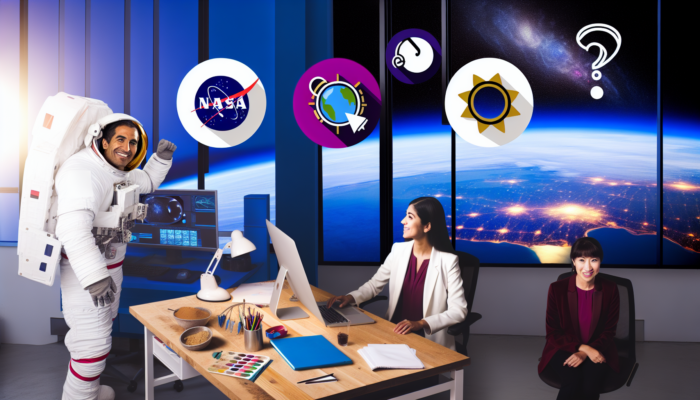Imagine waking up every day knowing your work contributes to exploring the cosmos. For many, this dream seems far-fetched, often reserved for those with advanced degrees and specialized knowledge. However, the reality is that NASA offers a variety of job opportunities that don’t require a PhD. This article explores how you can turn your passion for space and science into a fulfilling career at NASA, even if you don’t hold a doctorate.
The Fascination with Space
From childhood, many of us gaze up at the stars, dreaming of what lies beyond our planet. Movies like “Interstellar” and shows like “Cosmos” ignite our curiosity about the universe. This fascination often leads to the question: how can I become a part of this incredible journey? While many believe that only scientists or astronauts can work with NASA, the truth is far more inclusive.
Understanding NASA’s Workforce
Navigating the vast landscape of NASA’s workforce requires understanding that it’s not just about scientists and engineers. NASA employs a diverse range of professionals, from educators to technicians, who all play essential roles in the agency’s mission. This means that regardless of your background, there may be a position for you at NASA that aligns with your skills and interests.
Exploring Job Opportunities at NASA
NASA offers various job opportunities that cater to a multitude of skills. Here are some paths you might consider:
- Administrative Roles: These include positions in human resources, finance, and project management. Even if you don’t have a technical background, your organizational skills can contribute significantly to NASA’s projects.
- Technical Support: Many jobs require technical skills like IT support, software development, and system administration. If you have a knack for technology, you could be a vital part of NASA’s operations.
- Public Engagement: NASA is always looking for individuals who can help communicate its mission to the public. This can include roles in marketing, social media, or education. If you are passionate about sharing knowledge, this could be your entry point.
- Research Positions: While many require advanced degrees, some entry-level research positions are available for candidates with strong analytical skills and a passion for science.
The Importance of Networking
One of the most effective ways to learn about job opportunities at NASA is through networking. Attending conferences, workshops, and seminars related to space and science can help you connect with professionals in the field. These connections can lead to internship opportunities or even job offers.
Consider joining professional organizations or online communities that focus on aerospace, engineering, or science communication. Engaging with like-minded individuals can provide insights and guidance as you navigate your career path.
Utilizing Internships and Fellowships
Internships and fellowships are a great way to get your foot in the door at NASA. Many of these programs are designed for students and recent graduates, but there are opportunities for individuals at various career stages. These positions often provide hands-on experience and valuable industry connections.
NASA’s internship programs, such as the NASA Intern Program and the Pathways Intern Employment Program, offer students a chance to work on real projects while learning from experienced professionals. Completing an internship can enhance your resume and make you a more competitive candidate for future positions.
Preparing Your Application
When applying for a job at NASA, it is essential to tailor your application materials to highlight your relevant skills and experiences. Here are some tips to enhance your application:
- Research the Role: Understand the specific requirements and responsibilities of the position to which you are applying. Tailor your resume and cover letter to align with these expectations.
- Highlight Relevant Experience: Even if you lack direct experience in aerospace, emphasize transferable skills from previous roles, such as teamwork, problem-solving, and communication.
- Prepare for Interviews: If you land an interview, prepare by practicing common interview questions and researching NASA’s current projects and initiatives.
The Value of Continuous Learning
Working at NASA requires a commitment to continuous learning. Whether through formal education, online courses, or self-study, staying updated on industry trends and advancements is crucial. Many professionals at NASA take advantage of educational resources available through the agency, including workshops and seminars.
Success Stories: Real People, Real Jobs
To illustrate the diverse paths individuals have taken to secure jobs at NASA, let’s explore a few success stories:
- Maria’s Journey: Maria began her career as a science communicator at a local museum. Through networking and internships, she eventually landed a position at NASA’s education office, where she develops programs to engage students in STEM.
- James’ Transition: James was an IT support technician at a private company. After several years of self-study and gaining certifications, he applied for a technical support position at NASA and successfully transitioned into the aerospace industry.
- Emily’s Passion: Emily was a recent graduate with a degree in environmental science. She utilized NASA’s internship program to work on a project related to climate change, which ultimately led to a full-time position at the agency.
Leveraging Social Media and Online Platforms
In today’s digital age, social media and online platforms serve as powerful tools for job seekers. Follow NASA’s official social media accounts to stay updated on job postings, news, and events. Additionally, platforms like LinkedIn can help you connect with current employees and learn about their experiences.
Participating in discussions and sharing your insights on platforms like Twitter and Reddit can also help you build your online presence and demonstrate your passion for space exploration.
Understanding the Hiring Process
Understanding NASA’s hiring process can demystify the application experience. Typically, the hiring process involves several steps:
- Application Submission: Submit your application through the USAJOBS website, ensuring all required documents are complete and accurate.
- Screening: Applications are screened to determine if candidates meet the minimum qualifications.
- Interviews: Selected candidates may undergo one or more interviews, which can be conducted in-person or virtually.
- Offer and Onboarding: Successful candidates will receive a job offer and begin the onboarding process, which includes background checks and training.
Embracing Your Unique Path
Securing a position at NASA may seem daunting, but it is essential to embrace your unique journey. Many individuals have taken non-traditional routes to enter the aerospace field, proving that passion and determination can outweigh formal qualifications.
Final Thoughts: The Sky Is Not the Limit
In summary, landing a job at NASA without a PhD is entirely possible. By understanding the various roles available, utilizing internships, networking, and continuously learning, you can turn your dream of working with NASA into a reality. Remember that every journey is unique, and the sky is not the limit when it comes to pursuing your passion for space exploration. So take that first step, and who knows, you might just find yourself working on the next big mission to explore the universe!
“





